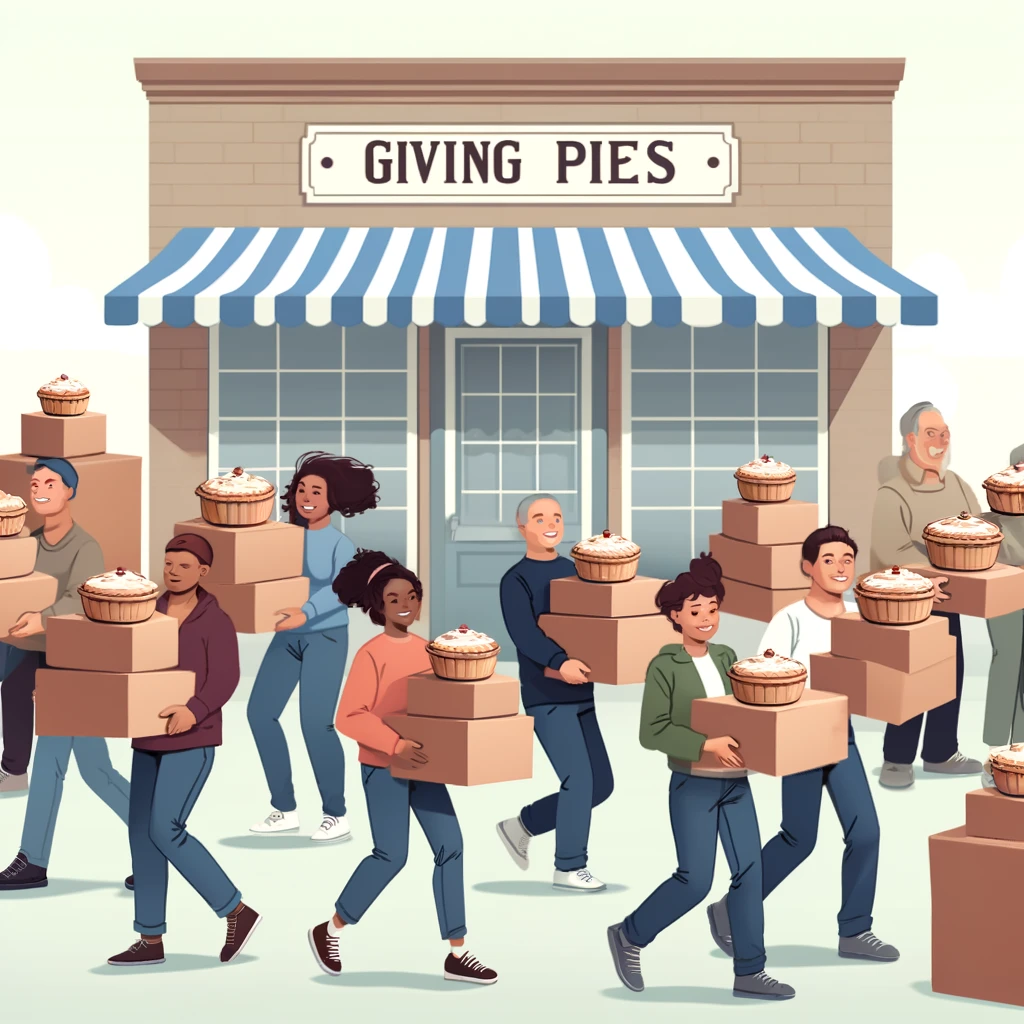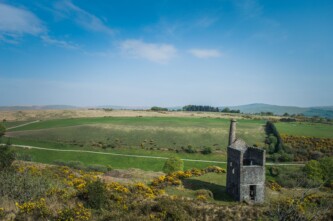The Wakhi shepherdesses in Pakistan have been really important in their community for a long time. These women take their flocks of animals to the mountains to graze, and the money they make helps their community with things like healthcare, education, and building things. But now, there are only seven shepherdesses left, and their way of life is dying out. BBC 100 Women went with them on one of their last trips to the mountains.
The journey to the Pamir mountains is really dangerous. There are steep paths and the risk of landslides. The shepherdesses have to whistle and shout at their animals to keep them on the narrow paths. In the past, lots of shepherdesses would make this trip every summer, but now it takes five days instead of three. The older shepherdesses are always ahead because they’re used to the high altitude.
The shepherdesses remember how hard things were in the past. They didn’t have proper clothes or shoes for the journey. They used to wear simple robes and walk on ice without shoes. They also faced personal challenges, like not having healthcare in the mountains and losing children. But even with all these problems, they became successful businesswomen. They collect milk from their animals and make dairy products, which they trade for things they need.
The women’s shepherding and the men’s farming have made a big difference in the community. The money the shepherdesses make helped build the only road out of the valley, which made it easier to get healthcare, education, and new opportunities. The younger generation has taken advantage of these opportunities by going to school and starting businesses in tourism and hospitality.
Even though the shepherdesses are proud of what their children have achieved, they’re sad that they can’t make the trips to the mountains anymore. Being a shepherdess means a lot more to them than just having a job. It’s a strong connection to the land and a special part of their heritage. One of the shepherdesses even wants to be buried next to her children in the mountains, showing how much the land means to them.
The story of the Wakhi shepherdesses shows us a unique and disappearing way of life in the mountains of Pakistan. They’ve faced a lot of challenges, but they’ve worked hard and helped their community. Their story teaches us about the difficulties that rural communities face when things change and become more modern.
Original news source: The last of their kind: The unique life of Pakistan’s Wakhi shepherdesses (BBC)
Listen
Slow
Normal
Fast
Group or Classroom Activities
Warm-up Activities:
– News Summary
Instructions: Divide the class into pairs or small groups. Give each group a few minutes to read the article. Then, have them summarize the main points of the article in a news report format. Each group must present their summary to the rest of the class.
– Opinion Poll
Instructions: Write a series of statements related to the article on the board. For example, “The shepherdesses’ way of life should be preserved” or “Modernization is more important than preserving traditional lifestyles.” Have students stand on opposite sides of the room to indicate whether they agree or disagree with each statement. Give them a few minutes to discuss their opinions in pairs or small groups. Then, conduct a class poll by calling out each statement and asking students to raise their hands if they agree or disagree.
– Vocabulary Pictionary
Instructions: Divide the class into pairs or small groups. Give each group a set of vocabulary words related to the article. One student from each group must draw a picture to represent each word while the other students in the group guess the word. The group that guesses the most words correctly wins.
– Speed Summarizing
Instructions: Write a series of key words or phrases from the article on the board. Divide the class into pairs. One student from each pair must summarize the article using as many of the key words or phrases as possible in one minute. After one minute, the pairs switch roles. The pair with the most accurate and comprehensive summary wins.
– Pros and Cons
Instructions: Divide the class into two groups. Assign one group to argue the pros of preserving the shepherdesses’ way of life and the other group to argue the cons. Give each group a few minutes to brainstorm their arguments. Then, have them take turns presenting their arguments to the class. Encourage students to use evidence from the article to support their points.
Comprehension Questions:
1. Why have the Wakhi shepherdesses been important in their community for a long time?
2. Why is the journey to the Pamir mountains dangerous for the shepherdesses?
3. How have the shepherdesses improved their way of life over time?
4. How have the shepherdesses helped their community with the money they make?
5. What opportunities have the younger generation in the community taken advantage of?
6. Why are the shepherdesses sad that they can’t make the trips to the mountains anymore?
7. What does being a shepherdess mean to the women?
8. What does the story of the Wakhi shepherdesses teach us about rural communities?
Go to answers ⇩
Listen and Fill in the Gaps:
The Wakhi shepherdesses in (1)______ have been really (2)______ in their community for a long time. These women take their flocks of animals to the (3)______ to graze, and the money they make helps their community with things like healthcare, education, and building things. But now, there are only seven shepherdesses left, and their way of life is dying out. BBC 100 Women went with them on one of their last trips to the mountains.
The (4)______ to the Pamir mountains is really dangerous. There are steep paths and the risk of landslides. The shepherdesses have to whistle and shout at their animals to keep them on the narrow (5)______. In the past, lots of shepherdesses would make this trip every summer, but now it takes five days instead of three. The older shepherdesses are always ahead because they’re used to the high altitude.
The shepherdesses remember how hard things were in the past. They didn’t have proper clothes or (6)______ for the journey. They used to wear simple robes and walk on ice without shoes. They also faced personal challenges, like not having healthcare in the mountains and losing children. But even with all these (7)______, they became successful businesswomen. They (8)______ milk from their animals and make dairy products, which they trade for things they need.
The women’s shepherding and the men’s farming have made a big difference in the (9)______. The money the shepherdesses make helped build the only road out of the valley, which made it easier to get healthcare, education, and new opportunities. The younger generation has taken advantage of these opportunities by going to school and starting businesses in tourism and (10)______.
Even though the shepherdesses are proud of what their (11)______ have (12)______, they’re sad that they can’t make the trips to the mountains anymore. Being a shepherdess means a lot more to them than just having a job. It’s a strong (13)______ to the land and a special part of their heritage. One of the (14)______ even wants to be (15)______ next to her children in the mountains, showing how much the land means to them.
The story of the Wakhi shepherdesses shows us a unique and disappearing way of life in the mountains of Pakistan. They’ve faced a lot of challenges, but they’ve worked hard and (16)______ their community. Their story teaches us about the difficulties that rural communities face when things change and become more modern.
Go to answers ⇩
Discussion Questions:
Students can ask a partner these questions, or discuss them as a group.
1. What is a shepherdess?
2. How do the shepherdesses in Pakistan help their community?
3. How would you feel if your way of life was dying out?
4. Do you think it’s important to preserve traditional ways of life? Why or why not?
5. What challenges do the shepherdesses face during their journey to the mountains?
6. How would you feel if you had to walk on ice without shoes?
7. Do you like the idea of being a shepherdess? Why or why not?
8. What impact have the shepherdesses and farmers had on their community?
9. How has the money earned by the shepherdesses helped their community?
10. Do you think education and new opportunities are important for rural communities? Why or why not?
11. How would you feel if you couldn’t do something that was a special part of your heritage?
12. What does being a shepherdess mean to the women in the article?
13. Do you have a strong connection to the land where you live? Why or why not?
14. How do you think the younger generation can continue to honor their heritage while embracing modernity?
15. Why do you think it’s important to learn about the difficulties faced by rural communities?
Individual Activities
Vocabulary Meanings:
Match each word to its meaning.
Words:
1. shepherdesses
2. community
3. mountains
4. healthcare
5. education
6. businesswomen
7. heritage
8. challenges
Meanings:
(a) Medical services and treatments
(b) Women who take care of animals in the countryside
(c) Tall and rocky areas of land
(d) Women who run their own businesses
(e) Difficulties or problems that need to be overcome
(f) Cultural traditions and history passed down through generations
(g) A group of people who live in the same area
(h) Learning and gaining knowledge
Go to answers ⇩
Multiple Choice Questions:
1. What is the main source of income for the Wakhi shepherdesses?
(a) Working in healthcare
(b) Building things
(c) Taking their animals to the mountains to graze
(d) Trading dairy products
2. Why is the journey to the Pamir mountains dangerous?
(a) Wild animals on the way
(b) Lack of proper roads
(c) Extreme weather conditions
(d) Steep paths and the risk of landslides
3. How long does it take the shepherdesses to make the trip to the mountains now?
(a) Three days
(b) Five days
(c) One week
(d) Two weeks
4. What did the shepherdesses wear during their journeys in the past?
(a) Proper clothes and shoes
(b) Simple robes
(c) Traditional dresses
(d) Winter coats
5. What do the shepherdesses trade their dairy products for?
(a) Things they need
(b) Money
(c) Education
(d) Healthcare
6. What has the money made by the shepherdesses helped build in the community?
(a) New schools
(b) Hospitals
(c) The only road out of the valley
(d) Tourism attractions
7. What opportunities have the younger generation taken advantage of?
(a) Becoming shepherdesses
(b) Working in healthcare
(c) Building roads in the mountains
(d) Going to school and starting businesses in tourism and hospitality
8. Why are the shepherdesses sad that they can’t make the trips to the mountains anymore?
(a) It’s a strong connection to the land and their heritage
(b) They don’t enjoy being shepherdesses
(c) They don’t like the dangerous journey
(d) They want to start businesses in tourism and hospitality
Go to answers ⇩
True or False Questions:
1. The journey to the Pamir mountains is not dangerous due to steep paths and the risk of landslides.
2. The shepherdesses used to face hardships, such as lack of proper clothing and shoes, but they still became successful businesswomen by trading dairy products.
3. Whistling and shouting are used by the shepherdesses to keep their animals on the narrow paths.
4. The money earned by the shepherdesses supports their community with healthcare, education, and infrastructure.
5. The younger generation has benefited from the money earned by the shepherdesses, pursuing education and starting businesses in tourism and hospitality.
6. The Wakhi shepherdesses in Pakistan do not play a vital role in their community by taking their animals to the mountains to graze.
7. Currently, there are more than seven shepherdesses left, and their traditional way of life is not disappearing.
8. The older shepherdesses are not more experienced and are always ahead due to their familiarity with the high altitude.
Go to answers ⇩
Write a Summary:
Write a summary of this news article in two sentences.
Check your writing now with the best free AI for English writing!
Writing Questions:
Answer the following questions. Write as much as you can for each answer.
Check your answers with our free English writing assistant!
1. Why are the Wakhi shepherdesses important to their community?
2. What are some of the dangers the shepherdesses face on their journey to the mountains?
3. How did the shepherdesses overcome the challenges they faced in the past?
4. How has the money made by the shepherdesses benefited the community?
5. Why is being a shepherdess more than just a job for these women?
Answers
Comprehension Question Answers:
1. Why have the Wakhi shepherdesses been important in their community for a long time?
The Wakhi shepherdesses have been important in their community because they take their flocks of animals to the mountains to graze, and the money they make helps their community with things like healthcare, education, and building things.
2. Why is the journey to the Pamir mountains dangerous for the shepherdesses?
The journey to the Pamir mountains is dangerous for the shepherdesses because there are steep paths and the risk of landslides. They have to whistle and shout at their animals to keep them on the narrow paths.
3. How have the shepherdesses improved their way of life over time?
The shepherdesses have improved their way of life over time by collecting milk from their animals and making dairy products, which they trade for things they need. They have also used the money they make to help build the only road out of the valley, which made it easier to get healthcare, education, and new opportunities.
4. How have the shepherdesses helped their community with the money they make?
The shepherdesses have helped their community with the money they make by using it to build the only road out of the valley, which made it easier to get healthcare, education, and new opportunities. The money has also been used to improve their way of life and support their families.
5. What opportunities have the younger generation in the community taken advantage of?
The younger generation in the community has taken advantage of opportunities such as going to school and starting businesses in tourism and hospitality. They have used the education and resources available to them to create new opportunities for themselves and their community.
6. Why are the shepherdesses sad that they can’t make the trips to the mountains anymore?
The shepherdesses are sad that they can’t make the trips to the mountains anymore because being a shepherdess means a lot more to them than just having a job. It’s a strong connection to the land and a special part of their heritage. They feel a deep emotional attachment to the mountains and the lifestyle they represent.
7. What does being a shepherdess mean to the women?
Being a shepherdess means a lot to the women because it represents a strong connection to the land and a special part of their heritage. It is not just a job, but a way of life that holds deep meaning and significance for them.
8. What does the story of the Wakhi shepherdesses teach us about rural communities?
The story of the Wakhi shepherdesses teaches us about the difficulties that rural communities face when things change and become more modern. It shows the challenges they have to overcome and the importance of preserving traditional ways of life. It also highlights the resilience and hard work of rural communities in adapting to change and improving their lives.
Go back to questions ⇧
Listen and Fill in the Gaps Answers:
(1) Pakistan
(2) important
(3) mountains
(4) journey
(5) paths
(6) shoes
(7) problems
(8) collect
(9) community
(10) hospitality
(11) children
(12) achieved
(13) connection
(14) shepherdesses
(15) buried
(16) helped
Go back to questions ⇧
Vocabulary Meanings Answers:
1. shepherdesses
Answer: (b) Women who take care of animals in the countryside
2. community
Answer: (g) A group of people who live in the same area
3. mountains
Answer: (c) Tall and rocky areas of land
4. healthcare
Answer: (a) Medical services and treatments
5. education
Answer: (h) Learning and gaining knowledge
6. businesswomen
Answer: (d) Women who run their own businesses
7. heritage
Answer: (f) Cultural traditions and history passed down through generations
8. challenges
Answer: (e) Difficulties or problems that need to be overcome
Go back to questions ⇧
Multiple Choice Answers:
1. What is the main source of income for the Wakhi shepherdesses?
Answer: (c) Taking their animals to the mountains to graze
2. Why is the journey to the Pamir mountains dangerous?
Answer: (d) Steep paths and the risk of landslides
3. How long does it take the shepherdesses to make the trip to the mountains now?
Answer: (b) Five days
4. What did the shepherdesses wear during their journeys in the past?
Answer: (b) Simple robes
5. What do the shepherdesses trade their dairy products for?
Answer: (a) Things they need
6. What has the money made by the shepherdesses helped build in the community?
Answer: (c) The only road out of the valley
7. What opportunities have the younger generation taken advantage of?
Answer: (d) Going to school and starting businesses in tourism and hospitality
8. Why are the shepherdesses sad that they can’t make the trips to the mountains anymore?
Answer: (a) It’s a strong connection to the land and their heritage
Go back to questions ⇧
True or False Answers:
1. The journey to the Pamir mountains is not dangerous due to steep paths and the risk of landslides. (Answer: False)
2. The shepherdesses used to face hardships, such as lack of proper clothing and shoes, but they still became successful businesswomen by trading dairy products. (Answer: True)
3. Whistling and shouting are used by the shepherdesses to keep their animals on the narrow paths. (Answer: True)
4. The money earned by the shepherdesses supports their community with healthcare, education, and infrastructure. (Answer: True)
5. The younger generation has benefited from the money earned by the shepherdesses, pursuing education and starting businesses in tourism and hospitality. (Answer: True)
6. The Wakhi shepherdesses in Pakistan do not play a vital role in their community by taking their animals to the mountains to graze. (Answer: False)
7. Currently, there are more than seven shepherdesses left, and their traditional way of life is not disappearing. (Answer: False)
8. The older shepherdesses are not more experienced and are always ahead due to their familiarity with the high altitude. (Answer: False)
Go back to questions ⇧















